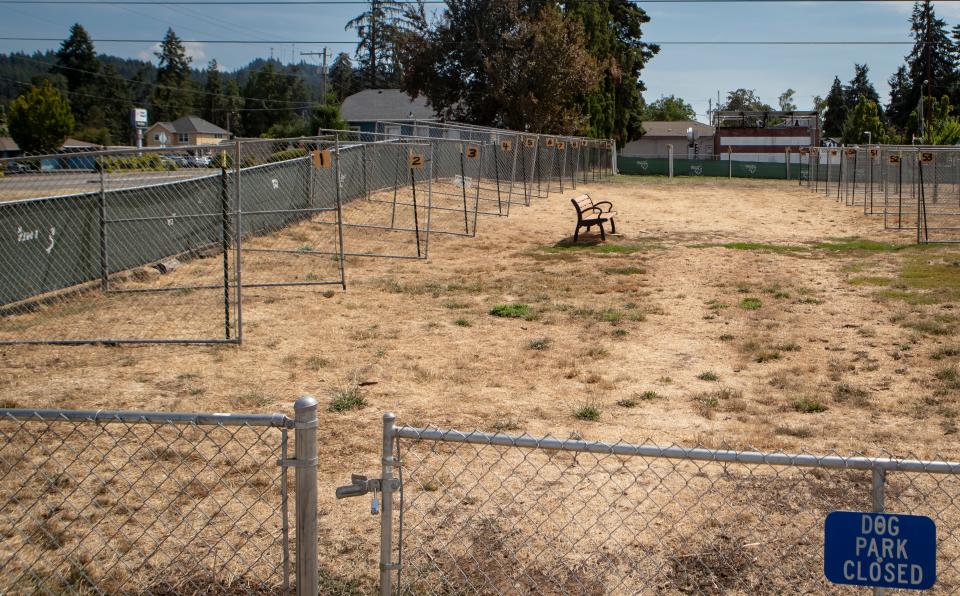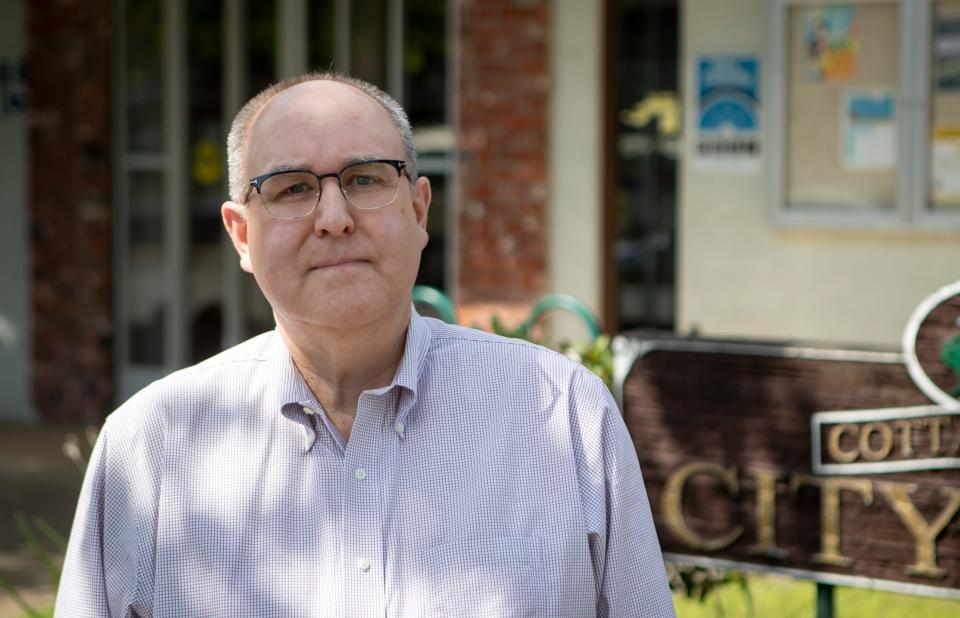Brett Rogers has spent two years cultivating patches of land at the Douglas Ave. camp in Cottage Grove, transforming spaces into thriving plots full of strawberries, grapes and pumpkins. A small flock of three chickens would follow him around the property as he mowed the lawn he seeded and tended to the garden.
For Angelina Crofford, the Douglas camp was a lifeline, offering safety and community after she and her son became unhoused following a missed paycheck.
Now, the grass Rogers planted is dead, and he, Crofford, and the other Douglas camp occupants are forced to leave behind the lives they’ve built.
If they want a place with guaranteed power, running water, restrooms or safe sleeping spaces, their only option is to relocate to a dog park.

Closed for cleaning
The City of Cottage Grove is closing two sanctioned camping sites for cleaning, including the Douglas Ave. camp, and temporarily moving all the site occupants to a city-owned dog park before shifting from a 24/7 site schedule to a dusk-to-dawn schedule.
A picturesque mountain home to around 10,000 people about 30 miles south of Eugene, past the urban-rural boundary that separates the Willamette Valley from the rest of the state, Cottage Grove is just the latest Oregon city embroiled in conflicts over homelessness.


A two-hour trip down Interstate 5 is Grants Pass, a city at the heart of a recent U.S. Supreme Court ruling that allows cities to arrest and fine individuals for sleeping in public spaces.
The state has been ground zero for a number of disputes over homelessness in recent years, with debates playing out in real time — and in real lives — about how local governments are expected to manage homeless populations and the services set up to support them.
Locally managing a national crisis
In 2022, the city adopted a resolution establishing a management plan for the allowable use of public lands by individuals experiencing homelessness. Since then, two main camps located at Douglas Ave. and 12th St. have been considered home by about 70 people across the two camps, according to Cottage Grove City Manager Michael Sauerwein. The city’s only shelter at Highway 99, formerly managed by the nonprofit Carry It Forward, closed on July 30.
Now, Douglas and 12th St. camp residents must vacate those properties.
Where should they go? The City says to Lulu’s Dog Park.
Camp reactions to eviction notices
Rogers has been in Cottage Grove for 18 years and has lived at the Douglas camp for two. He said he mows the lawn and tends to the gardens he has sown to keep busy, keep the space nice and keep himself out of other people’s “drama.” His three chickens followed him around the property. Once the camp got a two-week eviction notice, he gave them away.
“I was just making a home for myself. I felt comfortable here, trying to improve the situation and then pretty much it’s a curveball,” Rogers said.
“I’m right back at the place I was two years ago. I might be a little bit better off than I was but still. All the things I’ve done here and I just have to walk away.”


Angelina Crofford and her dog Hatchette have been living at the Douglas camp for a year. Crofford said the stability of the camp helped her to feel supported, especially when she and her son first became unhoused.
“The first night, we slept in front of McDonald’s and the second night, we slept in front of Safeway. Then we found out about this place. I would be nowhere without it,” Crofford said.
“I wouldn’t have half the life lessons I’ve learned or skills that I’ve picked up since I’ve been here, like learning to power things with a battery. I would have never known any of that, anything about propane or survival — really, anything.”
For Crofford, becoming unhoused came as a result of a single missed paycheck.
“I had an apartment and a job and everything and I got sick. As a widow, I missed one paycheck and that destroyed me,” Crofford said.
“I worked my butt off to get here, honestly. I worked two jobs and homeschooled and that was after my husband passed and I still ended up here so it doesn’t really say much about working hard to get far, like my mom said.”
She said folks at the camps are “scattered to the wind” in the face of these eviction notices. She plans to camp near the river but worries about being alone and the risk of flooding as summer ends.
Both she and Rogers agree that relocating to the dog park is not a reasonable option. When asked if others were interested in moving to Lulu’s Dog Park, Crofford responded, “The dog kennels? No.”
Rogers said the dusk-to-dawn model is limiting due to the short timeframe when tents are allowed.
“There’s no use of throwing up a tent that you just have to break down so they want us to throw our blankets down on dog (expletive) and sleep in dog (expletive). That’s what they think of us,” Rogers said.
“Nobody in this camp or the 12th St. camp thinks that the dog park is a good idea and nobody wants to go there.”
‘Unsafe and unsanitary’ and the move to Lulu’s Dog Park
At Lulu’s Dog Park one day before the Aug. 22 eviction deadline, chain link fences section off 10-by-10 foot squares where tents will be allowed from 7 p.m. to 7 a.m. Sauerwein said the City has identified 60 to 70 spots at the dog park that can host overnight campers. The Register-Guard counted 54 marked tent spaces at the park on Wednesday.
“We really have two basic goals. The first goal is to clean up the 12th Street and Douglas sites because they are unsafe and unsanitary,” Sauerwein said.
“Really our second goal is to transition to a 7 p.m. to 7 a.m. camp from the 24-hour camps that we currently have because we want to give folks a safe and secure space to spend the night.”
He said the current plan for these sites is to clear the Douglas and 12th St. camps and to utilize city staff and resources to clean the locations. While cleaning takes place, Lulu’s Dog Park serves as a temporary site with dusk-to-dawn hours. Once the 12th St. location is cleaned, individuals will be able to use that space for overnight rest. The Douglas camp is not planned for reopening post-cleaning.


The city aims to finish site cleanings by the end of September, but Sauerwein said they won’t know the extent of the work until the camps are vacated. He also said he hopes there will be adequate space at the dog park but that the City won’t be sure of this until after the evictions. As this process begins, Sauerwein said the city has been partnering with organizations like HIV Alliance to provide support to those impacted by these changes.
“Look, I’m not an expert on running homeless camps. It’s not something I have any expertise in and that’s why we’ve been reaching out to the county,” Sauerwein said.
“The reality is Cottage Grove doesn’t own this issue. This is an issue that’s countywide, statewide and to be honest, it’s a national issue.”
Sauerwein said “housing is key” when addressing the housing crisis and that city partnerships with agencies like Homes For Good help ensure that affordable and accessible housing is a focus for city planners.
The city’s motivation for changing site locations and structure stems from safety and sanitation concerns. While city staff work to address those issues, Cottage Grove Chief of Police Cory Chase said he and his officers support these communities, too. He said part of the job is making sure that officers are visible within the community and when folks first encounter a police officer, that their initial introductions are positive.
“A lot of times, our officers are getting calls there (to camps) because they’re calls for service but what I always tell people is it’s not unlike any other residential area in the community,” Chase said.
“I went over to the site on Douglas (Ave.) on Monday morning and when I show up, a couple of the residents there greet me with, ‘hey, Chief,’ because they know me. We’ve had that interaction where we’ve had a chance to build relationships with folks.”
Cottage Grove reacts
As Sauerwein sees it, Cottage Grove has addressed the city’s homelessness and housing crises “head-on” with the establishment of it’s homeless management plan. He said the undertaking of cleaning these camps as it is now many change in the coming weeks but that regardless of the possibility of this shifting plan of action, the city is committed to following state statutes and supporting individuals.
“I think Cottage Grove has handled it very well. One thing Cottage Grove definitely did was take the issue head-on by establishing a management plan a couple of years ago,” Saurwein said.
“The city really has made an effort to address the situation.”
Chase said he discusses Cottage Grove’s homelessness issues with statewide counterparts who share similar struggles in their own communities. He echoed Saurwein’s praise of the city’s direct approach, adding that while these past efforts have been commendable, they need to test new avenues in search of local solutions.
“We’re at that point where we need to try something different but we don’t know. I think what we’re doing is Cottage Grove is continuing to take this head-on and we are willing to try something new to see if we can get a different outcome,” Chase said.
“When I talk to my counterparts around the state, they say the same thing. Nobody has this magic solution and so we’re all kind of sharing ideas. … We’re all looking to see what works best for our communities.”


He said these most recent decisions have been met by residents with curiosity and that much of the feedback he has heard revolves around questions like, ‘What happens next?’ and ‘What does this change look like?’ He said he has also seen support for changing the way things are structured now.
“There’s support, there’s appreciation that we’re not just sitting back and doing nothing, that we’re trying something different and we’re staying on top of it. We’ll continue to follow it and see how it progresses and see what this looks like six months from now,” Chase said.
“If we have to pivot again, that’s kind of what we do, right? I always tell my staff, ‘there’s no finish line.’ We’re never going to be done evolving so this whole thing will continue to evolve and we just have to continue to adapt.”
A slew of factors
Seasons of change come and go and it seems that Cottage Grove is deep in the heart of one such season.
A July special election saw the recall of three city council members. Grievances voiced by the recall campaign cited the city’s designation of unhoused camping sites, the city’s decision to address the homelessness crisis with a “housing first” model, an increase in utility bills and the hiring of Sauerwein as City Manager over promoting the City’s Public Works Director, who also applied for the position.
St. Vincent de Paul of Lane County also had plans to reopen the Highway 99 shelter and provide support services there. In the midst of the recall election, SVdP pulled its plans from Cottage Grove as the community decided how it wanted to address and manage its housing and homelessness crises.
The decisions come with new options — and new responsibilities — facing local governments. Nationwide, the U.S. Supreme Court ruled in June’s Grants Pass v. Johnson case that unhoused individuals can be arrested and fined for sleeping in public spaces, holding that ordinances allowing these punishments do not constitute as cruel and unusual punishment.
Regarding these changes from the recall, Sauerwein said city staff “try to stay in our lane.”


“The first thing they teach in city manager school is to stay out of city council politics and stay in our lane. Nothing good ever happened from a city staff getting involved in city council politics. We’re the operations side,” Sauerwein said.
“I’m a professional government manager, I’m not a politician so anything involving the recall or political decisions about whether or not St. Vincent’s was going to build here — that’s the city council’s role. It’s not my lane, not my issue.”
What is Sauerwein’s issue, however, is making sure that the changes to the Douglas Ave. and 12th Street sites lead to the safe and sanitary overnight sleeping conditions this cleaning has promised. As this process moves forward, Chase said the situation is likely to shift as workers unveil the full scope of restoration efforts needed to get these sites spick and span.
“We’ll continue to address it and stay on top of it and continue to adapt and be flexible with it, as well,” Chase said.
Hannarose McGuinness is The Register-Guard’s growth and development reporter. Contact her at [email protected]
This article originally appeared on Register-Guard: Homeless residents forced out by Cottage Grove camp evictions
Source Agencies

